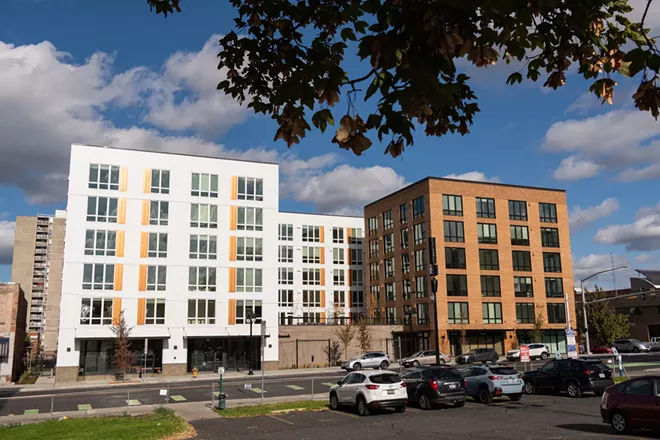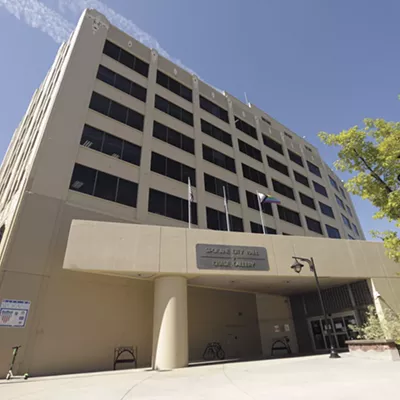
Turns out a parking spot can be a lot more expensive than its monthly fee. Building designated parking for apartments is a hidden expense that can drive up rent — but local leaders want to change that.
On July 10, Spokane City Council members will vote on temporarily eliminating off-street parking requirements for new housing within a half-mile of public transit stops, as well as for residences in the city's "Centers and Corridors" identified in Spokane's comprehensive plan for development. The proposal is co-sponsored by city council members Zack Zappone and Jonathan Bingle.
Current zoning laws typically require residential developers to provide one off-street parking spot per unit. Parking requirements for residential buildings have already been eliminated in downtown Spokane. The proposed policy is set to last just one year.
"It impacts environment and sustainability by improving infrastructure for transit and less reliance on cars, but it also addresses affordability," Zappone says. "It makes housing cheaper by reducing the cost per unit."
Because of the housing crisis facing the nation as well as Spokane, the effort to incentivize affordable housing development appeals to both sides of the aisle, according to Zappone and Bingle.
Building one parking space can cost up to $50,000, according to Matt Edlen of Edlen & Co., a developer for the Warren Apartments building on Riverside Avenue and Browne Street in downtown Spokane. Parking can eat up to 15 percent of a developer's budget, says Zappone.
A parking spot can never generate the amount of money it costs to build, Edlen says, so the expense often creeps into other areas, mostly rent. Relaxing regulations would let developers decide how much to spend on parking — if developers choose lower upfront expenses, it could result in lower rents.
Still, developers will likely continue to build parking because the market demand is high, Edlen says. In downtown Spokane, zoning laws don't require any off-street parking, but it's a top priority amenity for many renters. About half of the units in the Warren have access to a parking space, though about 80 percent of residents want a spot, Edlen says.
Bingle doesn't expect developers to abandon parking entirely. "I just want to give them an option, depending on what's going on," he says.
According to Spokane's Housing Needs Assessment, the city hopes to build 6,000 new housing units by 2037. Bingle hopes to reach this goal sooner, in order to relieve city stressors as quickly as possible.
If this new proposal is adopted, the council would collect data to determine how much the reduced requirements incentivized growth in one year.
"What I would like to see is the amount of projects that are coming to our pre-development team in the next year that are interested in this," Bingle says.
Since the interim ordinance would be in place for a year, the focus would be on gauging interest and creativity in the planning stages, not counting fully constructed buildings, Bingle says. The policy would probably need to be in place for two to five years before the city feels an impact.
Still, the proposed change has precedent.
"It's something that's been actually happening around the country," Zappone says, in cities like Richmond, Virginia; Bend, Oregon; Anchorage, Alaska; and San Diego. According to Zappone, San Diego saw a 400 percent increase in affordable housing proposals after eliminating parking requirements.
"If they choose to eliminate some parking, it could increase the livability space of the housing," Zappone adds. "So that could be another metric too. Are we seeing this type of development impacting the types of housing that's being built?"
The council would also monitor for adverse impacts, like street parking getting too crowded. Another determining factor could be the strength of Spokane's public transportation system. If it's popular enough to attract people who might normally otherwise use a car, it could help decrease the demand for parking.
"Transit is definitely a key partner for all of development," Zappone says. "We are fortunate to have a transit agency that is focusing on transit-oriented development and a city that is aligning with that."
Zappone adds that the City Line, a new 6-mile bus rapid transit route connecting the city from east to west, is improving transit, and that a generational shift toward busing and biking is helping reimagine urban spaces with fewer parking spots. ♦
























